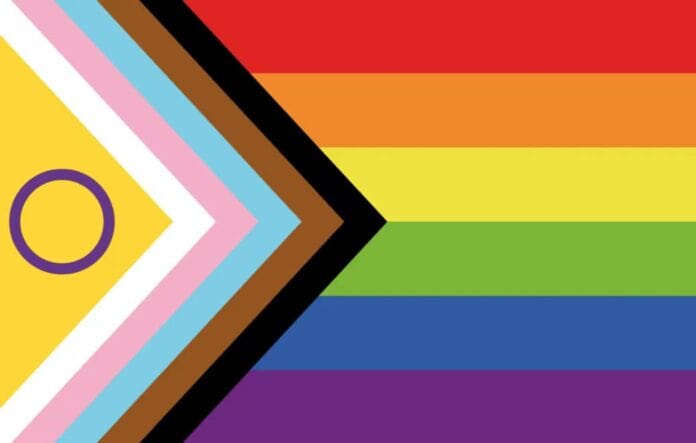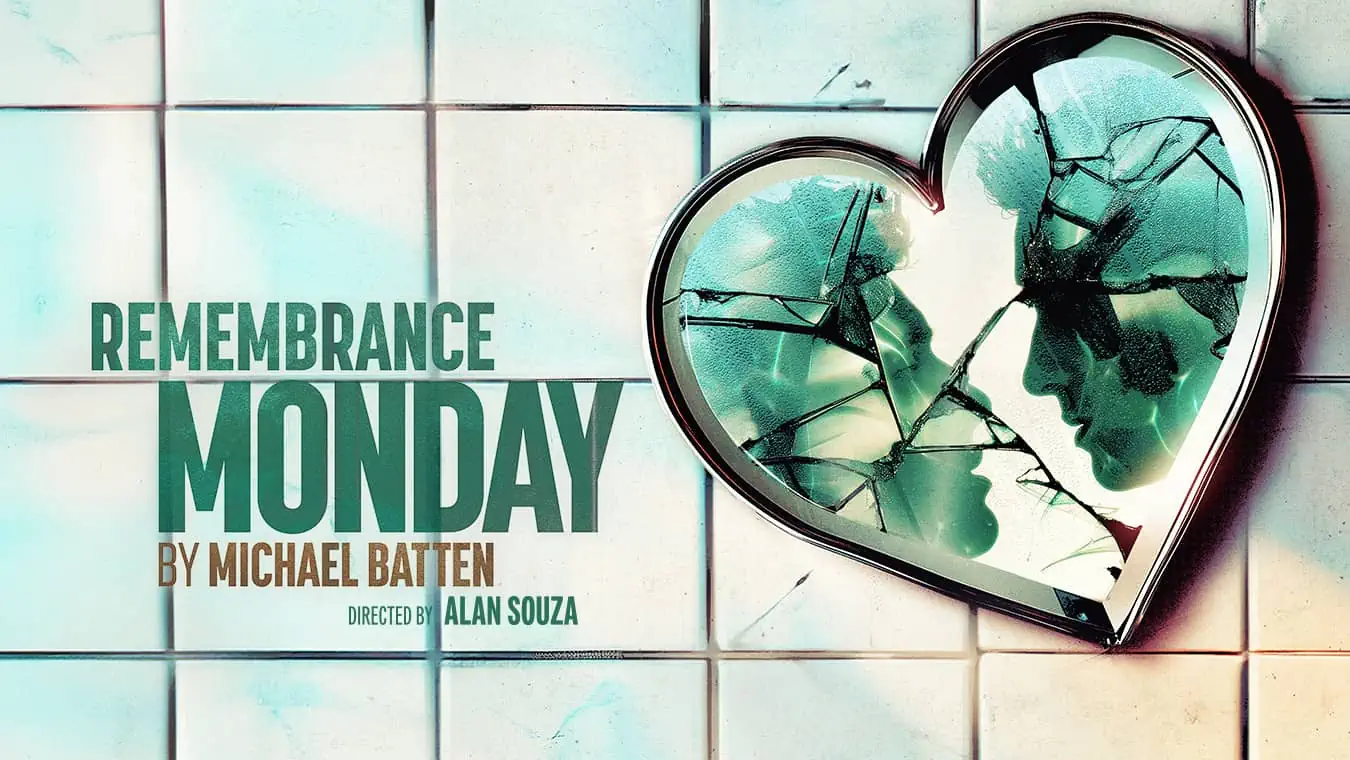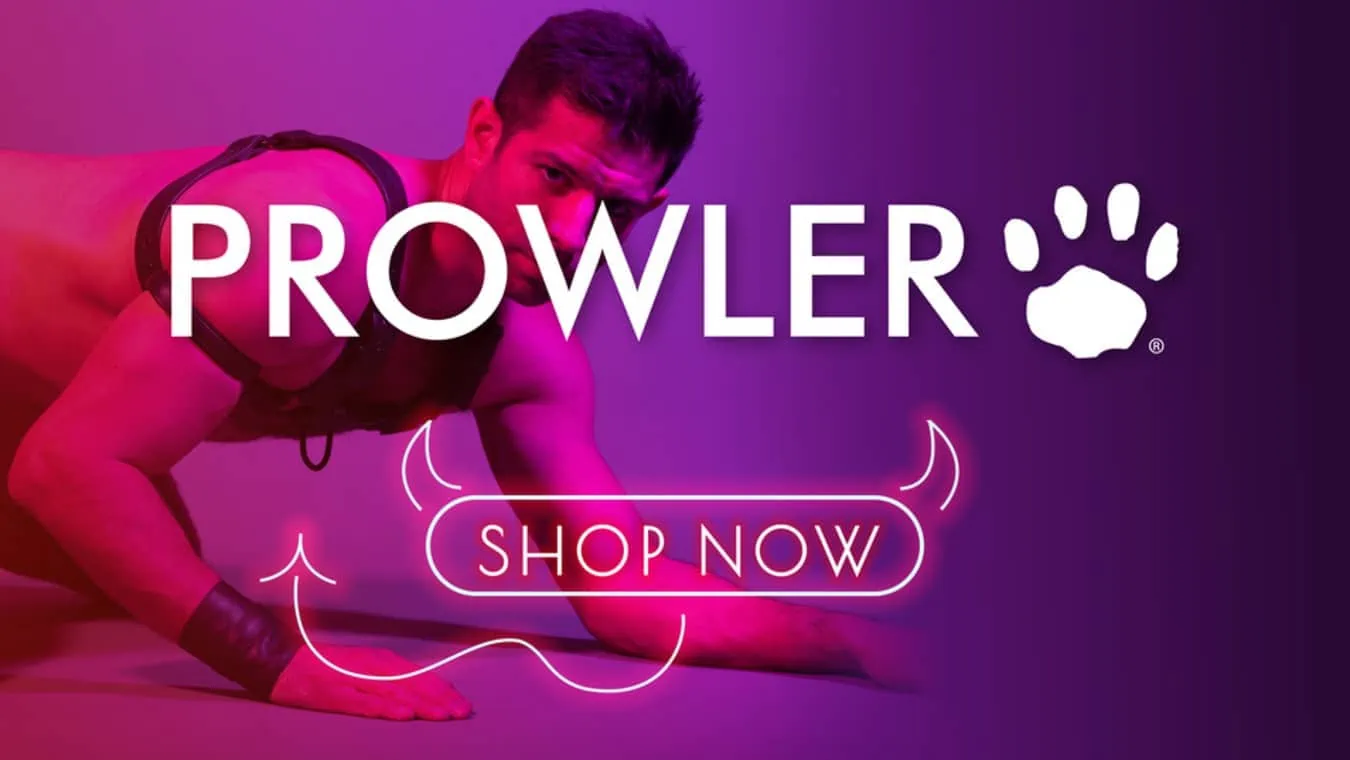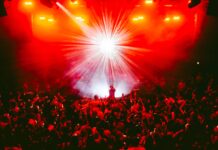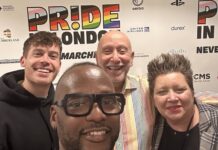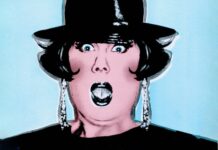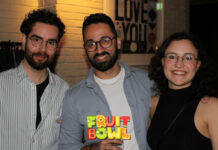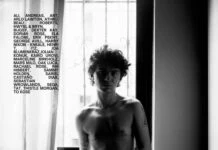Jacob Joyce is an artist, curator and performer living and working in London. He speaks to Patrick Cash about his work, issues of race and sexuality, and the narratives of oppression.
By Patrick Cash
Image by Kal Sereousz.
Just to start off – who is Jacob Joyce?
I am a performance artist and curator and I work mainly with issues of marginalisation so that can be anything from trying to find a space that is not noticed or underused and use it as a platform for local artists, and specifically people who haven’t studied art as well who might otherwise find it hard to find a place to exhibit work. My own personal practice of work is usually focused on the African diaspora and the various belief systems that sprung up out of slavery, so when Christianity was forced upon slaves who had no identity but it didn’t really work and they managed to create new religions through voodoo and all of the Lakumi faiths and all different versions of Yoruba. I also studied sculpture, so I make sculpture a lot as well.
How did you get into working in art originally?
Well I was kicked out of school when I was sixteen and I kind of thought ‘oh no, that’s the end for me, I don’t know what I’m going to do’ but I ended up meeting a lot of people who were at university, studying fashion, costume making and painting, and I’ve always had sketch books and always made things, and they said I should go to art college and I should try to do something creative. So I went to South Thames college – it’s kind of the college that a lot of people who leave school go to – used it as a chance to build up a portfolio to get into Wimbledon and then from Wimbledon went to Brighton, and then just kept making artwork. But I’ve always made artwork, always used it as a kind of form of therapy in a way.
It’s an expression?
Um yeah expression, but I think for everybody, even writing as well and music, it’s all kind of…
Cathartic?
Cathartic, yeah. I mean a lot of my sculptures that I sell are kind of totems to problems that I’ve had to tackle in my own life and kind of providing mirrors so people can see those things that we all struggle with represented in a piece of artwork. It’s been an expression of either anger or a celebration of happiness but it’s always been some way of dealing with an issue.
And do you feel that your art reflects upon gay society?
I’m not sure. I think as a curator I have worked with House of Brag: the London Queer Social Centre and organised their events and tried to add artwork to reflect the struggles of the gay community, but I think that’s a very specific gay community. Even my interest in Yoruba and these faiths that came out of Nigeria and West Africa is reflective of the gay community. My understanding of the gay community is very disparate, that it’s fragmented, almost like tribes of people. I don’t feel that there’s one cohesive gay scene, I feel that a lot of gay people have their friends who they know from the gay scene and they all go to clubs, just like any other scene, people go out and make friends but it doesn’t seem like one thing. It seems like it’s made up of lots of different things who are all involved in their own struggles, whatever that is, to do with their class or ethnicity, their gender or whatever problems they’re having, but I don’t think they’re problems that are shared collectively. I think they’re all very much individual so my artwork does deal with different issues that I don’t think are exclusive to sexuality. My work specifically with the House of Brag, painting murals in their spaces, and making sculptures and organising – I organised a death dinner for the first place that they were in, so that people were invited to bring recipes passed down from their grandparents, or ones that they’d made themselves, and then use it as a platform to talk about death. And each person went, along a table with wreaths hanging around it, and talked about their experience of death and shared stories of people they knew who’d died and I’d say that’s my artwork. That night was a curatorial piece of work, but does that reflect the gay scene? There were lots of gay people there, but it’s not really to do with sexuality in a sense. And I think my work at the moment, with trying to organise this ‘Survival Guides’ event, you could say it’s reflective of the gay scene because I’m trying to provide a platform for the House of Brag and people like yourself and gay artists and musicians and poets, but not exclusively at all.
It doesn’t have to be. It’s just whether sexuality seeps into your art, even through ideas of marginalisation…
It does. I think it definitely seeped into my work a lot more when I was studying because I think when I was younger my sexuality was something I was very much still trying to understand and artwork was a way of understanding it. But I feel since leaving university – like, I don’t feel sexuality is a big, defining part of my personality or my identity. So that’s telling in my artwork.
Okay, cool. We’ve kind of touched upon how you’re involved with alternative queer institutions on the gay scene like House of Brag etc, how did you get involved with them and can anybody get involved?
I think it’s really imperative that people do feel welcome to become involved with the House of Brag – I became involved with the House of Brag through word of mouth. I heard there was a group of gay people and queer people and queer allies who were trying to set up a social centre and host events, everything from self-defence to relaxation and spoken word and all these different events but with a mind to be inclusive, and all under a safer spaces policy so that nobody felt that it was somewhere they’d be penalised or scrutinised or made to feel strange or their strangeness could be embraced. So I thought I wanted to help these guys in any way I can, I want to go down there and make some sculptures, do some paintings, organise some events. But the thing about House of Brag which is important is it’s a squatted project and I think a lot of people in the LGBT community are disconnected from our struggle and that a lot of it came out of people carving out a space for themselves. The gay scene, just like a lot of other commercial scenes, is a money-making machine, it doesn’t have the interests of anyone at heart except the money. That’s why we organised the alternative anti-corporate Pride parade, it was because we thought we were tired of having the pink pound milked out of us and Gay Pride is about a global struggle, it’s not about buying a pink cowboy hat and paying £25 to go and listen to Atomic Kitten in the park. That is an offence to any marginalised culture, it’s also playing on a stereotype of gay people that I find personally quite crude. So we wanted to organise a parade and a series of events that celebrated the struggle of Gay Pride, and wasn’t about money, and you didn’t have to pay to be a part of it, you didn’t have to pay to get in, you could bring your own alcohol. That was in 2013, but there is a long history of gay people taking property for themselves, making it their own and forging their own communities because even the first gay community centre that was legal and wasn’t a squat had so many problems and faced so much trouble staying open it seems like it is a battle and I think House of Brag needs more people to reconsider their preconceptions of squatting and think about it. There’s a terrible, terrible demonization of squatted communities in the media at the moment, trying to paint them as kind of people who have come over from Romania who are going to steal your house whilst you’re on holiday, but that is just not representative of what squatting is. It’s a British tradition, and that has lead to so much fantastic activism, so many fantastic LGBT projects.
Do you feel the assimilation of gay culture in to more mainstream society is making us lose a viewpoint on what’s important? It’s instigating apathy?
Oh, totally. I think that the British government, capitalism and pop culture has realised that gay people have a lot of money and a lot of power, and that the pink pound is a valuable asset so you have to satisfy that community and try and make them seem like they are catered for and they are accepted when in actuality I’m sure you can find so many situations where gay people feel like they’re not accepted and they’re not embraced, just like many other communities. The fact that David Cameron has pushed forward this gay marriage bill – if you’re a Christian and you’re gay you should be allowed to be married. Why should you not? If it’s your religion, why should you not be allowed to partake in its practises? But in terms of the broader gay community I think it is a box-ticking exercise to try and placate by giving little titbits – I mean David Cameron was asked before he came into power, ‘what do you think of gay rights?’ and his response was ‘I think that gay rights are human rights’, and then the interviewer asked ‘so what do you plan to do when you get into power to help gay rights?’ and he had nothing to say. Watch it, it’s on Youtube, it’s incredible. He sits there, he twiddles his thumbs, he looks around and then he says ‘can we stop the interview?’ and the guy says ‘no.’ He had no answer. So when he got into power he had to find a way to tackle the fact that he clearly had no idea about gay rights.
That’s on Youtube?
It’s on Youtube. It’s hilarious, but also shocking. He doesn’t care about gay people.
But he needs to be seen to make a stance. I mean, he used to work in PR, didn’t he?
Yeah. So he needed to make a stance because he realised that he’d fallen short and it’d become quite clear that he didn’t give a shit about gay people and I think that when gay people were more openly discriminated against, it meant that we were all more unified by that and it meant that we could all take a stance for these issues, but now that we’ve all been given a ‘scene’, a place where we can go and spend money, which was originally owned by straight people and is now owned by gay people – I don’t think it makes that much difference to me at all, it still doesn’t seem like it’s tackling any of the wider issues of oppression. I think we’ve definitely moved forwards, but the struggle is far from over. Instead of using a position of privilege to carry on the fight, we’ve been made to feel so comfortable we don’t feel that we need to fight. It mirrors the relationship that a lot of people have to racism, which is that a lot of people who don’t face racism in their daily lives or at all in their lives feel that it’s over, and I have close friends who went to see 12 Years a Slave and then literally say things like ‘oh god, I didn’t realise it was so bad, thank god it’s over’, or they’ll say ‘it’s so good we’ve got Barack Obama as President of the US and we’ve moved forwards in terms of racism’ and it kind of feels almost like they’re not aware of the mass incarceration of black people at the moment and the institutional racism of so many industries. And I don’t think I’ve ever heard – or ever will hear – a person of colour say anything along the lines of ‘we should live in a colour blind world’ or ‘racism is over’ or disregard race as an important issue, because they have to deal with it a lot of the time. And that mirrors homosexuality.
How do you feel the gay community treats race?
I think again it’s exactly the same, I don’t think the gay community has a specific outlook towards race because I think the gay community is made up of lots of different people of different races, especially because London is a place where gay people and lots of people from across the world come to because it’s a place that doesn’t have terrible laws to try and oppress gay people, I think that my experience of being gay in London is that it’s diverse and as diverse as any other scene. It’s the same as saying ‘what is the art scene’s relationship towards race?’ It totally depends upon what group of people you’re speaking to.
You don’t feel that race is sometimes a hidden subject?
I think it’s exactly the same in all commercial scenes really. You come across preconceptions about ethnicity and people asking you questions, the most obvious question being ‘where are you from? No, but where are you from?’, you get that a lot on the gay scene but I don’t think that’s exclusive to the gay scene at all, you get that everywhere. And I don’t think that the gay scene has a specific outlook on race that is very different from Shoreditch or Hackney or even Camberwell. My experience of going gay clubbing in London has always been that there’s a few black people, a few Asian people, predominately white, but it’s kind of the same if you go anywhere, unless you’re at a night of African music or something. In terms of commercial scenes in London, the gay scene doesn’t really differentiate. Is it alright to ask you how you feel about that?
Yeah, sure. Why I wanted to speak about it is because I know that you speak very eloquently in discussions of race, and recently I’ve been researching a feature on growing up gay and Muslim and for those men I spoke to, being Muslim is their identity and they find the gay scene hard to incorporate themselves into because in some ways they perceive an institutionalised racism. Obviously that’s not exactly the same issue…
I think it’s interlinked. I know quite a few people who are gay and come from Muslim households but there is an Islamophobia that is present in the UK, but again it’s not exclusive to the gay scene, and so I can imagine Muslim people recognizing it and feeling a little bit of that negativity cast onto them but I don’t think that’s exclusive to the gay scene. I think it’s very hard for gay Muslims as it is for any LGBTQ people who are in communities with strict religious views that condemn homosexuality.
Part of the reason why I wanted to talk about it and to ask whether it was a hidden subject is because I haven’t really perceived that myself, but I don’t know firsthand to be dealing with the gay scene with a darker skin colour. But it’s good to hear that it’s not something you think is a problem.
You’re just as likely to hear a racist comment in the gay scene as you are on a bus, in a pub or any public place.
Okay, just to talk about the recent Macklemore debate now. There were some comments that he attests that hip-hop is homophobic from its origins as a black music genere and by extension therefore he’s saying that black people are more homophobic – do you think this is an elongated reading, and where do you stand on this issue?
I don’t think it’s necessarily the fault of Macklemore, and I don’t think that Macklemore is consciously trying to say that black people are more homophobic than white people. But I think that he is perpetuating a stigma within the music industry that is so old, and that a lot of people of colour and a lot of musicians of colour are probably sick to death of – that a music genre will be predominately black, like jazz or soul or hip-hop or rap, and then it – basically it’s such a systemic problem. It’s not the musicians, it’s the people inside at the heads of the companies, predominately white men, and they want to invest in music that perpetuates an idea of blackness. They want to invest in rap music that shows guys with guns and big chains and women with big tits because that’s their idea of what it is. There have always been gay black musicians and black rappers rapping about Jesus and rapping about Allah and all different manner of things and it’s not just bitches and bling, but that’s what’s to be invested in. And that’s slightly annoying in 2013 to see there are so many amazing black rappers like LE1F and Cakes Da Killa and Mykki Blanco and queer rappers like Angel Haze and lots of people as well coming out and talking about their struggle of being black and gay/queer and it not really getting that much media attention. But then a middle class white person come along and says ‘hey, it’s okay to be gay’ and suddenly he wins all the awards. It reminds me too much of Elvis, when there were all these oppressed black people making music about their hardships and literally singing songs about oppression, and then he took those songs and just sung them in a cheerful way like ‘hey, hey, hey’ and he’s just King of Pop. And it was just a bit like ‘woah, how did that happen?’, they were just telling their own story, why is it any different for you? It’s not the fault of Macklemore, it’s just a bit of an irritating pattern to keep noticing. I think that rappers like LE1F talk about homosexuality and the AIDS crisis and oppression and talk about their body in ways that doesn’t debase or sexualise them, but in ways that just celebrates them. I feel that’s so exciting and new, but there’s nothing new about what Macklemore’s doing. That is the reason that a lot of people, including myself, have been frustrated. I mean the fact that he starts the song with ‘hey, I’m not gay’, it reminds me of the whole ‘no homo’ thing, you know ‘I’ll talk about this, but don’t think I’m gay.’ Just like I express my own troubles and my own things I’ve had to deal with through my artwork, because it makes me feel more human and more able to go on living and do what I do, to make artwork about these things, and I see that is what so many marginalised communities have done and it’s really annoying when someone takes what you’ve done.
How do you feel that black culture treats homosexuality in general then?
It’s the same as with the gay scene question. Black culture is a huge, huge thing. In terms of a vague response to that, the black community in London from what I can see doesn’t have that much more homophobia than the white community, I think maybe a difference is that the black community that I know could be perceived to be louder about their beliefs. I mean growing up in a school, or a few schools, that were predominately black students or split 50/50 with black and white and Asian students, I think you get a lot of – I’ve spoken about this with my friends who are lesbian as well, how the black girls that were at school were very vocal about their beliefs, and what’s wrong and what’s right. I’ve been thinking about this a lot recently and to me it’s become pretty clear that, of communities that are oppressed, it’s diverted and it comes out in other places and if you’re not given a voice on TV and you can see no black female politicians and no black female Disney princesses, you can see no black female people, then you think ‘I can talk, I can be loud, I can be my own character’ and you see it burst out. You might be more likely potentially to hear a black girl call you a faggot, but I don’t think that’s because there’s more homophobia in the black community, I think again it’s a systemic problem. Of course that is not a defining statement, and in my own experience I’ve experienced lots of homophobia from white people and black people but I think you might just hear it a bit louder from a community that doesn’t have much of a voice in other places.
Okay, in general, huge question, do you see race relations, LGBT integration etc moving forward positively in society, Western society to be specific?
Yes, I think so. I think we’ve got a long, long way to go though.
And finally, where can we see your art next, and what projects are you working on?
I’m currently working with a space called Brixton East, a beautiful space in Brixton, and a space named Art Nouveau working with grass roots organisations: Plunge Theatre which is a feminist theatre collective, the House of Brag (the London Queer Social Centre), the London Lakumi Choir, which is a Cuban choir that celebrates deities from Africa along with traditional African dancers, lots of spoken word artists including yourself, and organising workshops. It’s going to be great, it’ll be fantastic. Workshops on living for free and squatting and making your own clothes and not having to waste clothes so much, and assertive workshops and how to deal with street harassment and oppression. It’s called Survival Guides and it’s all about finding the tools to combat oppression in our day to day lives through art and creativity. And I guess my contribution to that is as curator and facilitator, and as a general rope to pull people closer together.
- For more information on Jacob’s work and art, and to find out more about any of the Power Animals featured on this page, visit: http://jacobvjoyce.com/

